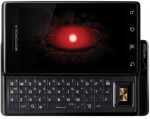There was a frisson of excitement in the cellular telephony market a few days ago with the launch of a new mobile phone called the Droid. As the owner of a very old Motorola® MOTOKRZR™ phone and tied to the Verizon network, this new technology could be the ersatz iPhone® I have been looking for.
So, over the unseasonably warm Ohio weekend, I took a trip out on my Triumph® motorcycle to the local Verizon store, where I was able to get my hands on this new smartphone. It is, as the marketing suggests, a pretty cool device and offers the same general features as Apple® iPhone, as well as access to new apps – even if there are currently fewer on offer than the iTunes® store.
The word droid is clearly a contraction of android, which the OED defines as “An automaton resembling a human being.” (OED, Vol. I, p.452.) However, the phone in no way, shape, or form resembles a human being – unless the human being under consideration has had a horrific accident in a car crushing machine.
So how has this change comes about?
The first mention of android is in Ephraim Chambers’ Cyclopedia; or, an universal dictionary of arts and sciences, which was published between 1722 and 1751. Here, he says, “Albertus Magnus is recorded as having made a famous androides.”
By the mid-20th century, androids were also seen as being part human. The Spectator magazine on 19th September, 1958, said, “Today SF [science fiction – Ed.] must be more than a blood-and-sex day-dream spattered with words like android (robots made of flesh and bone).” This also marks the distinction between a robot (from the Czech word robota meaning “forced labor”) and android.
The use of the circumcised form, droid, appears to have originated in the first of the Star Wars series of movies back in 1977. Incidentally, this lopping off of the linguistic foreskin is called aphesis, from the Greek ἀπό for “away” andἵημι meaning “to send.” Cutting off the end of a word is apocope, from the Greek ἀποκόπτω, which means “cut off.”
This notion of Star Wars being the progenitor of droid is reinforced by the very recent filing for Droid as a trademark by Lucasfilm Ltd. They claim specifically that they want the mark reserved for;
“Wireless communications devices, including, mobile phones, cell phones, hand held devices and personal digital assistants, accessories and parts therefor, and related computer software and wireless telecommunications programs; mobile digital electronic devices for the sending and receiving of telephone calls, electronic mail, and other digital data, for use as a digital format audio player, and for use as a handheld computer, electronic organizer, electronic notepad, and digital camera; downloadable ring tones and screen savers; cameras, pagers and calling cards.”
I add all this information to highlight the fact that words can be very, very serious business. Many people think that etymologists (folks who are interested in word origins) are geeks who live in cloud cuckoo land. Not so. In fact, trademarking is an area of business where etymologists can be very useful folks to have around.
More interesting is that the filing comes now, just prior to the release of the Motorola Droid, which doesn’t appear with a trademark but is cited as being “under license from Lucasfilms Ltd.” The actual filing is dated October 9th, 2009, which looks suspiciously like a last-minute dash by the Lucas attorneys to snag the mark before Motorola.
The word android is rooted in the Greek word ὰνδρο, meaning “man,” and the suffix -ειδῄς, “having the likeness of.” It’s the same root as the word androgyne, a being with the physical characteristics of both a man and a woman. More commonly, the word hermaphrodite is used for such as blended person. This comes from the myth of Hermaphroditus, the son of Hermes and Aphrodite, who became half-man, half-woman after the gods fused him with the nymph, Salmacis.
The adjective form of the word is androidal, meaning “like an automaton,” but it is rare. A quick Google search reveals 150,000 ghits, most of which seem to be the names of companies.
Now not only can the iPhone brigade get their dose of The Word Guy on their phones but now the Droid set can join in with words on the web.




Awesome write up of the word droid! I recently discovered your blog via a RT from Twitter. I am currently taking a linguistics course and we just finished a unit on etymology. My opinion is that the naming of the phone “droid” is horrible marketing. To me the name conjures up something non-human. It feels cold and robot like. I really like your blog and now have to get to the business of following you on Twitter. Linguistics Rocks!
-Roger
PS- “Cutting off the end of a word is apocope” very cool to now know this!
Pingback: Google's Nexus One Faces New Woes | All New Stuff
Pingback: Google Nexus One Should Be Renamed, Says Philip K Dick’s Estate – Nexus One Central | Apps, Downloads, Forums, News and Updates
Pingback: Googlization: Am I Still Human? Or Android? | Tami Honesty
do we know if authors can use it in novels with out having to pay the EVIL Lucas for the term?
OK, so the disclaimer first: I am not an IP lawyer so what I offer is opinion based on my understanding of current IP law as it applies to the trademarking of words. In the filing cited above, the word “Droid” with an upper case “D” is claimed protection as it relates to its use as;
Wireless communications devices, including, mobile phones, cell phones, hand held devices and personal digital assistants, accessories and parts therefor, and related computer software and wireless telecommunications programs; mobile digital electronic devices for the sending and receiving of telephone calls, electronic mail, and other digital data, for use as a digital format audio player, and for use as a handheld computer, electronic organizer, electronic notepad, and digital camera; downloadable ring tones and screen savers; cameras, pagers and calling cards.
I see no reference to its status as a noun that describes a robot. And a trademark is NOT a noun; it functions as an adjective. Thus, you should write things such as “the Droid phone” and not “the Droid.” When a trademark switches to a noun, that’s the kiss of death for the mark and most companies will fight against it. Band-Aid(R) is trying hard to stop folks using “band aids” – you should use a “Band-Aid bandage.” Listen to their TV commercials when they sing “I’m stuck on Band-Aid brand…” where they use the mark as an attributive adjective to describe the word “brand,” not as a noun.
The other thing you need to do to protect a mark is make sure there is no “prior art,” which is examples of your mark previous to your filing. Now, according to the Oxford English Dictionary, they report the first quotation of the word “droid” as a shortening of “Android” in a 1952 sci-fi magazine called “If.” Here’s the quote:
They’re stopping robots in the streets—household Robs, commercial Droids, all of them.
Again, I am no lawyer but if there’s a printed copy of this available, I’d be up for taking on Lucas Arts if they tried to stop me using the word “droid” as a noun for a robot.
If anyone out there has a copy of this magazine, please check it and let me know if the citation is indeed accurate. I trust the OED on this but I’m also skeptical enough to want to see it with my own eyes!
I may be able to help with the “if” magazine situation. Which issue from 1952 contains the quote? A page number would also be helpful.
That’s was the problem, Nikolas; I couldn’t find an actual magazine to check the reference. The OED cites it but doesn’t reference it. By that, I mean the OED Online Version has “droid” as an entry but it only includes actual references for the top 1000 authors, and “IF” magazine isn’t there. The OED print 2nd edition, which is the current print edition, doesn’t have “droid” as an entry. It may be in one of the three printed “Additions” series but I don’t have those available currently. So hence my request for help from someone who may have a copy!